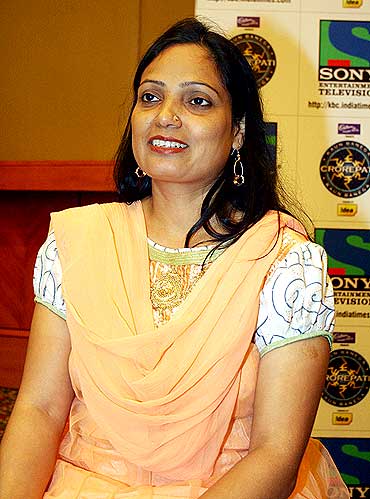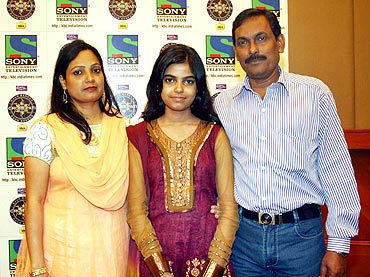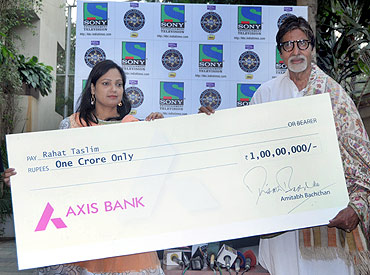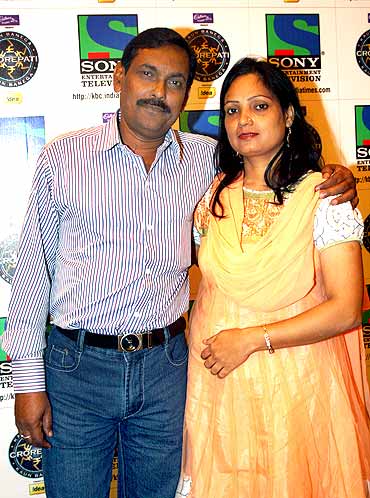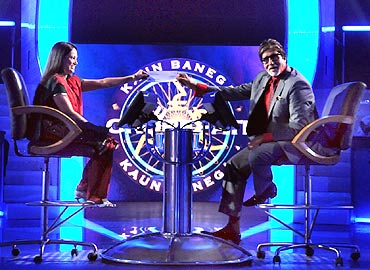 | « Back to article | Print this article |
The simple housewife who hit the jackpot

In our special year-end section, Rediff.com looks at people who wrote the India story this year.
Rahat Taslim, a simple housewife from Jharkhand who did not have a bank account till recently, was the first woman to win Rs 1 crore on the reality game show Kaun Banega Crorepati this season.
She tells Savera R Someshwar about the financial difficulties of her past and the jackpot that will change that forever.
'Mummy, hamari tabiyat bahut karab hai (Mummy, I am feeling very unwell).'
Hearing the frail little voice at the other end of the mobile phone, Rahat Taslim went cold.
Her 12-year-old daughter and 16-year-old son were alone at home in Giridih, Jharkhand.
"Mummy?"
The faint appeal bought Rahat to her senses and she began to talk firmly and calmly
"I never thought my stint with Kaun Banega Crorepati would begin like this," says the first lady winner ever, and the only Rs 1 crore winner this season, of the popular game show.
It was a journey filled with ups and downs, hope and despair, and many new experiences, including a flight in an aeroplane.
It was also a journey that would fulfil old dreams, and pave the way for new ones.
And here's how it began.
Never set foot outside her town, she had to go to Mumbai alone

October had never been a good month for Giridih resident Rahat Taslim. She would fall ill, or an unhappy event would take place.
This October was no different. As the month began, Rahat fell ill and, whatever she did, her health would not completely improve.
On October 17, which happened to be both her birthday and her wedding anniversary, her Kochi-based husband called. "Happy birthday," he told her lovingly. "Happy anniversary." They had been married for 18 years.
"What's the use of calling when you are so far away?" said an unwell Rahat. They chatted a bit before disconnecting. She had always considered October 17 an unlucky day.
In a while, the phone rang again. As her mother spoke, 12-year-old Tazeem listened intently. "It was a call from KBC. The conversation was clear enough for me to hear everything," she says. "I ran to call my brother."
A few minutes later, their mother put the phone down, her face glowing. The call had been a response to the SMS she had sent. On the phone, Rahat was asked three questions by the Kaun Banega Crorepati team on History, General Knowledge and Games. She had answered all three correctly.
"They asked me to register myself in Mumbai on October 26," she recalls.
"In the evening," says Tazeem, "Mummy called Papa."
In faraway Kochi, a stunned Imitiaz Ahmed was listening to his wife. "Please," she pleaded. "Let me go."
They had been having the same conversation for the last few minutes, but Imtiaz was yet to comprehend what was happening. His wife, who had never set foot out of small-town Giridih, wanted to go to Mumbai to take a chance at playing Kaun Banega Crorepati.
"There were so many questions racing around in my head," he recalls.
How was she going to go alone from Jharkhand to Mumbai? How could they afford it? Who would look after the children?
"She requested me a lot," he said. "But I said no."
Yet, he could not get the thought out of his head. "There had been many instances in our life," he said, "when I had not followed her advice and regretted it bitterly."
In the night, he called her back. "How will we manage?"
"Don't worry," she said. "You just say yes, I'll manage the rest."
She took a loan to make the trip
 The Ahmed family had never been well-off. As an office assistant with the Minerals and Metals Trading Cooperation, Imtiaz had just had his salary revised to Rs 10,000.
The Ahmed family had never been well-off. As an office assistant with the Minerals and Metals Trading Cooperation, Imtiaz had just had his salary revised to Rs 10,000. "It gave me a take-home of Rs 8,000, but that was still not enough." In March 2008, he had been transferred from Giridih to Kochi; from April 2008, the Ahmeds had been running two homes.
"My salary revision only happened recently, so you can imagine the kind of financial crunch we faced," he says.
Imtiaz could not supplement his income by moonlighting as a shop assistant or a tuition teacher. "Language is the biggest barrier. I come from a Hindi-speaking area, Malayalam is just beyond me."
Meanwhile, expenses were mounting. Both children attend an English medium school and, with additional tuition for their son Faisal Moazzam, their education expenses came up to Rs 2,300 every month.
"When the children fell ill," says Imtiaz, "we could not afford proper treatment."
Coupled with job uncertainty -- MMTC was keen on reducing numbers and increasing profitability through the Voluntary Retirement Scheme -- their financial scenario was looking increasingly grim.
Rahat decided to set up a sewing and embroidery centre at home. Soon, she expanded to teaching zari work and soft toys; she even took orders. A hobby became a much needed source of income; Rahat earned anywhere between Rs 2,000 and Rs 3,000 a month.
"She has always been determined," says her husband.
Yet, he did feel nervous when she took a loan of Rs 25,000 from her mausi (aunt) to come to Mumbai. He began to have second thoughts, but Rahat was convincing. "You know I am not a spendthrift."
She boarded her first flight

Mumbai airport, the Kingfisher counter.
Rahat had been waiting for over an hour, her cell phone did not work and there was no sign of her husband. He had flown in from Kochi and had been waiting at the wrong counter.
Her journey to Mumbai had been uneventful. She had taken the bus from Giridih to Ranchi, where she boarded her first-ever flight. It was a Kingfisher direct flight; the ticket had cost her Rs 7,000.
"Everything else was okay," she recalls. "I asked people for help and managed to get through all the procedures. But my heart skipped a beat when I had to check in my luggage. What if it got lost? What would I do then?"
Up in the air, higher than she had ever thought she would be, she enjoyed the view. "Take-off and landing reminded me of the times I played on the swing as a child," she smiles.
In Mumbai, she helped herself to a trolley and, with a small sigh of relief, collected her luggage. Someone bumped into her, and rushed past, saying sorry. "I turned to look," she says, "and it was Sunil Gavaskar!"
At the hotel, too, they were not ready to check the couple in. "They did not know whether we were married or not," she laughs. "We don't wear the overt signs of marriage like the sindoor or a mangalsutra. After checking our voter identity cards and tickets, they finally let us go up to our room."
The first thing the couple did was register Rahat's name for the audition.
With two days to go, they caught a few glimpses of Mumbai -- the Haji Ali dargah, the Gateway of India.
And opened her first bank account
|
|
She was number 13 that day at the KBC auditions. Imitiaz had dropped her at the venue and left to book their return tickets; he needed to get back to work as soon as he could.
Rahat's phone rang. It was her daughter. "Tazeem had high fever," Rahat recalls. "The children were alone at home. For a few moments, I did not know what to do."
Rahat took a deep breath and told her son Faisal to take Tazeem to a nearby doctor. "I had malaria and typhoid," say Tazeem. "Mummy said she could not come immediately; she was too far away."
When Imtiaz came back, Rahat was inside giving her written test. He had no idea how disturbed she was. After her video test, Rahat and the others were asked to return home. They would be called if they were selected.
"When Mummy came back on October 30," says Tazeem, "they had put me on saline."
In between nursing her sick child, Rahat rushed around to open a bank account and apply for a Permanent Account Number card. "Earlier," she says, "I would withdraw money from my husband's account through the ATM. There was no reason for me to have my own account."
On November 1, the phone rang in Giridh. Again. And again. And again. So many times that Rahat could not even step out the house. "The first call was the best." says Rahat. "I had been selected. The other calls were for verification."
The KBC video team descended on the Ahmed household -- Rahat and her children starred in a quick film about their lives, in preparation for her moment in the spotlight.
On November 5, Rahat and her husband were in Mumbai.
On the first day of the shoot, Rahat was not the quickest in the Fastest Finger First round. The next day too, she did not succeed. November 9 was a day of rest (KBC episodes are shot much before they are aired).
"The Fastest Finger First round is always easy. She knew the answers," says Imtiaz. But Rahat was struggling with the touch screen format used in the round.
With just two episodes left to be canned, Imtiaz was increasingly worried. Rahat spoke to her kids. "Hum karke dikhayenge (I'll do it)," she promised her daughter.
The next episode saw her lose by a margin of just 0.2 seconds. "By now," says Imtiaz, "I was really tense."
'It was a vindication for everything I had faced in my life'
|
|

"Which was the first African nation to elect a woman as its president?" Amitabh Bachchan intoned in his familiar baritone.
It was a heart-stopping moment for Rahat; if she did not know the answer, her hard-earned KBC fortune would slide down to Rs 3.20 lakhs; a cruel real-life game of snakes and ladders.
She went for her lifeline -- the Double Dip -- and gave her first answer, Kenya.
"It was wrong," she says, "but I had another chance."
Liberia, she said. "Last wohi hain (That's the only option)."
Nerve-racking seconds later, the studio erupted.
Her husband laughs, "I can't tell you what it was like. After the Rs 3.20 lakh question, I did not know any of the answers. But she knew everything!" Earlier, when she aced the Fastest Finger First round, he had jumped onto the stage in his excitement!
"It was a vindication for everything I had faced in my life," says Rahat, in the same calm, controlled manner she exhibited on the show.
For marriage at the young age of 18, a marriage she was not ready for.
For life in a conservative Muslim family, where she felt shacked by tradition and the purdah system.
For the job opportunities she had lost.
For all those who doubted her self-belief; who felt she was just another housewife.
For all those who refused to believe she was talented.
For every day she had spent counting every penny, scrimping here and adjusting there so that life could go on.
'It was a very tough time for me'

"I wanted to become a doctor," says Rahat. "My father was mentally disturbed. I wanted to be able to help people like him."
When 32-year-old Imitiaz's proposal came for her, 18-year-old Rahat had just completed her twelfth standard. Her mother approved; the boy had a job and had no dowry demands.
Rahat begged and pleaded, she wanted to study further. "But my mother wanted me to get married early; because of my father's condition, she was worried about the future. She promised me that they would let me study further."
But when young Rahat took her first shy steps into her marital life, she was in for a rude shock. From a large, liberal-minded joint family, she had moved into a traditional family that observed strict purdah.
"I tried to do as much as I could for her," says Imtiaz, "but I had to maintain peace on both sides."
"I was worried about his job," says Rahat. "There was no progress. I begged my husband to let me work, but he did not give me permission."
Two years into her marriage, in the face of much opposition, Rahat sat on her husband's bike for the first time. "We went to the market," she recalls. His family could not come to terms with this seemingly defiant act; women, they believed, were meant to remain, in purdah, within the four walls of the house.
Things between the couple and Imtiaz's family continued to deteriorate. Soon, the kitchens were separated. "It was a very tough time for me," Rahat recalls. "I had my son by then so I had to look after him and do all the housework myself."
It was then that Imtiaz decided it would be best to separate. "They could live life on their terms and we could start living our life."
'We invested a part of my Provident Fund in building a house'

"We could not live on rent forever, it was just not feasible," says Rahat.
They decided to build their house on the plot of land they got when the property was divided.
"Uska standard hamesha high raha hai (Her standard has always been high)," says Imtiaz. "If she goes shopping for slippers, she will buy the one she likes or not at all. She will never compromise and buy a cheaper slipper."
Rahat designed her dream home. Imtiaz was worried about how they would find the necessary finance. "I kept telling her the more design elements she put in, the more the house would cost. The more balconies there were, the more the house would cost. I didn't have that kind of money."
When their home was built, it was according to Rahat's specifications. "We took loans. We invested the refundable part of my Provident Fund in this house."
Their fights had always been around the lack of money. Imtiaz says, "Initially, I did not like the fact that she wanted to work. My sisters and I had been bought up in a very conservative atmosphere. I was influenced very much by my upbringing."
Rahat still wanted to work. "When our daughter was just two months old, she got the opportunity to appear for a teacher's exam," says Imtiaz. But the centre was in Gopalganj, in north Bihar (Giridh, which was part of Bihar before Jharkhand was formed, was then in south Bihar).
"It was the month of May and it was sweltering. I was very worried. After she went, if anything happened to our daughter, I knew I would never be able to forgive myself. She really wanted to go, but I somehow managed to convince her. That's how we lost that opportunity. This happened in 1999," he says.
Other opportunities came Rahat's way. She prepared for the Jharkhand Public Service Exam. She was even selected, but, again, Imtiaz did not allow her to go.
Another teaching opportunity came her way when the Jharkhand government issued an advertisement. Rahat filled the application form; they even deposited the draft. At the last minute, the high court decided that those who had not completed their BEd could not be appointed teachers.
Now banks are running after her to open an account

"If the government gives me a job, I would still like to become a teacher. There is nothing more exciting than being able to share the knowledge I have with children," says KBC's big winner.
If not, she plans to open a boutique.
Though the fruits of her win still have to reach her -- the money is given to contestants a few months after the episode is aired -- life has already changed for this feisty mother.
Friends, relatives and acquaintances are pouring into her house to visit her. She is a mini-celebrity who has been wooed by the national press and, now, by the local press in her home town. In January, she will be among the featured guests at a conclave on women, hosted by India Today magazine.
Where she struggled to open a bank account earlier, now the banks are running after her to open an account.
Her financial worries are thing of the past.
Her children have their immediate priorities clear. Her son, who is in Class 10, wants a mobile phone; her daughter wants a computer.
Her husband has the option of deciding whether he wants to go back to work. "He wants to work for two or three more years," she says. "He is hoping to get transferred to Delhi; if that happens, it will be good for the children's education."
There has been no change in her in-laws though. What has hurt her is the change in the people she considered her friends. "There are people in my mohalla (area), who I considered my friends, who are clearly unhappy with the change in my fortune. It's a strange, and not very nice, feeling."
Her children's education is secure. "My daughter wants to do her engineering at IIT. She has the brains for it and the cost, thankfully, is no longer a matter of concern. My son is an average student, but he has many more options before him now."
She will resume classes at her sewing centre.
And she will always consider October 17 her lucky day.
